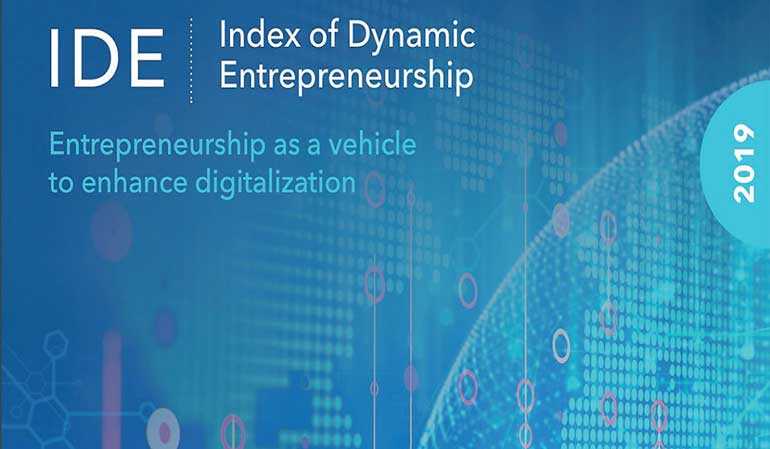Monday Feb 23, 2026
Monday Feb 23, 2026
Monday, 25 November 2019 00:00 - - {{hitsCtrl.values.hits}}

By Mark Marich
Buenos Aires, Argentina: The Index of Dynamic Entrepreneurship (IDE), released on 11 November by Prodem and the Global Entrepreneurship Network, recommends that policymakers looking to strengthen their national startup ecosystem should avoid focusing too heavily on any one specific solution.
The new report, released one week before millions of people around the world take part in Global Entrepreneurship Week (GEW) events, is intended to be a discussion starter for leaders as they explore innovative approaches to stimulating economic growth.
“As technological advances drive innovation and help lower barriers to entry, government leaders around the world are all looking for ways to help their entrepreneurs start and scale new firms without leaving their home countries,” said Hugo Kantis, Director of Prodem. “The latest Index of Dynamic Entrepreneurship examines the necessary conditions and shows that the top countries score strongly across the board – they don’t excel in just one dimension of their entrepreneurship ecosystem.”
The five top ranked countries – the United States, Finland, Netherlands, Singapore and Germany – all have only minor gaps among the study’s 10 key dimensions: Business Structure, Culture, Demand Conditions, Education, Entrepreneurial Human Capital, Financing, Policies and Regulations, Social Capital, Social Conditions and STI (Science, Technology, Innovation) Platforms.
The top 15 countries tended to score highly in Social Capital, had more sophisticated forms of financing available for entrepreneurs, benefitted from governmental initiatives focused on supporting entrepreneurship, and enjoyed a regulatory environment that favors the creation and development of new ventures.
South Korea made the biggest jump from last year, rising seven spots to 13th. Its large improvement is due in part to strengthening entrepreneurial human capital and also to formative factors, such as entrepreneurship education and cultural conditions, particularly the social value placed on entrepreneurial activity. Meanwhile, its government has played a critical role by encouraging the emergence of new, early-stage investment funds.
The Index of Dynamic Entrepreneurship is the result of research and development efforts that Prodem began more than 10 years ago, which built upon concepts first explored in its pioneering studies of the late 1990s. IDE’s primary focus is on dynamic entrepreneurship – those projects and new firms that manage to survive their first years in business, grow significantly, or have the potential for expansion.
The 2019 IDE Report covers 65 countries, and introduces an emerging area of policy analysis: to what extent do systemic conditions for entrepreneurship interact with the conditions that underly digital transformation dynamics. The results will be presented around the world in the lead up to and during Global Entrepreneurship Week in discussions among policymakers and stakeholders such as:
*The Entrepreneurship Policy Ministerial Roundtable of the Dominican Republic (12 November), which will include more than 20 cabinet-level officials.
*The Shanghai Opening of Global Entrepreneurship Week (15 November) led by China’s Yang Pu District Government officials.
*Briefing at the Washington Foreign Press Center for the US Department of State’s Bureau of Global Public Affairs (20 November).
The report is available for download from the Prodem website at https://bit.ly/33wyMXt.
Prodem is a think tank and a do-tank on innovation and entrepreneurship ecosystems in Latin America. With more than 15 years of experience, Prodem stands out for generating and transferring world-class knowledge in coordination with the actual practice of real-life actors. Prodem conducts research, studies and measurements to get insight into the status of ecosystems, providing technical assistance and training on entrepreneurship and innovation, both for scholars and professionals.
Prodem gives priority to the development of networks and alliances, and works to support governments, international organisations and other institutions of the ecosystem in confronting challenges related to the design and assessment of dynamic entrepreneurship and innovation policies. For more information about Prodem, please visit www.prodem.ungs.edu.ar.
The Global Entrepreneurship Network (GEN) operates a platform of projects and programs in 170 countries aimed at making it easier for anyone, anywhere to start and scale a business. By fostering deeper cross border collaboration and initiatives between entrepreneurs, investors, researchers, policymakers and entrepreneurial support organisations, GEN works to fuel healthier entrepreneurship ecosystems that create more jobs, educate individuals, accelerate innovation and strengthen economic growth. For more information visit: www.genglobal.org.
Mark is the executive vice president of the Global Entrepreneurship Network, a platform of programs and initiatives created by the communities that celebrate Global Entrepreneurship Week each November. Aimed at creating one global entrepreneurial ecosystem, GEN helps people in 160 countries unleash their ideas and turn them into promising new ventures.
Mark helped launch the initiative in 2008 and has provided strategic direction and communications leadership to help guide its expansion from a US-only pilot program in 2007 to its current global footprint. In support of GEW, he also helped develop the Global Entrepreneurship Congress—starting out as an internal planning conference and turning it into an annual gathering of 2,000 startup champions from ecosystems all around the world.
In addition to his global work, Mark serves as the curator for the Policy Dialogue on Entrepreneurship hosted at kauffman.org. Previously, he provided communications leadership on several national citizen engagement initiatives and more than 100 public forums on a wide range of policy issues, including: economic development; information technology; renewable energy; health care reform; retirement security; and workforce development.